Pembroke Sinclair's Blog, page 16
December 11, 2017
12 Days of Christmas Giveaway Hop
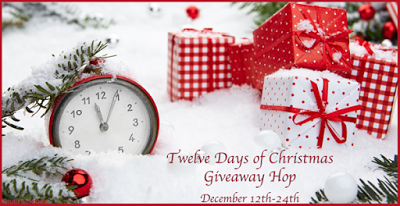
Wow! Only 12 days left before Christmas. I hope you're ready! But if not, you still have time. Now is the best time to take a little break and do something nice for yourself. I don't doubt you've been running around like crazy getting presents and decorations--not to mention getting ready for all the parties!
Curling up with a good book is the best to way to unwind and relax. In honor of the season of giving, I will be giving one lucky winner their choice of paperback from my collection (open to U.S. shipping only). You'll be able to pick from my fiction titles or my nonfiction titles.
All you have to do to be entered into the giveaway is leave a comment telling me what you like most about the holidays. Good luck!
After entering my giveaway, don't forget to check out the other blog participating in the hop!
Published on December 11, 2017 22:00
December 5, 2017
How Long Does It Take to Write a Book?
Like so many questions in writing, this one isn’t easy to answer. It can take as little as a few months to a few years to write a book—it all depends on how long it is, what age level it’s written for, how much time you dedicate to it, and how many rounds of edits you put it through.
I think the reason people ask this question is because they are worried or afraid of the amount of time they’ll have to commit to a novel. It can be daunting and scary to think that you’ll be working on the same story for years down the road, but if you are dedicated and intent on writing a great book, you’ll do what you have to to make sure it’s the best it can be. Conversely, if you can’t commit to working on something for months or years at a time, then perhaps a novel isn’t the best option for you as a writer.
However, that’s not to say that books that take weeks or a few months to write are terrible books. Some authors are faster than others and have more time to dedicate to their writing. The amount of time spent on a story is not indicative of how well it is written.
And let’s not forget about the amount of edits your story needs to go through—that adds time too. It is recommended that you have at least four editors go through your story before it’s ready to be published, and that’s not counting the amount of times you read through it. Of course, having that many editors go through your manuscript might not be within your budget, so it might not be feasible. Although, it is highly recommended that someone should edit your story before you attempt to get it published.
On average, you can probably expect to spend at least 6 months working on your book from first draft to final manuscript—although for some, that might seem like a short amount of time. If you’re not under a deadline, there’s no rush to get your book finished. You don’t win a prize for getting it done in a certain amount of time. Take the time you need to make sure the story reads the way you want it to. In the end, as the author, you have to be proud of what you’ve created before you can share it with the world.
I think the reason people ask this question is because they are worried or afraid of the amount of time they’ll have to commit to a novel. It can be daunting and scary to think that you’ll be working on the same story for years down the road, but if you are dedicated and intent on writing a great book, you’ll do what you have to to make sure it’s the best it can be. Conversely, if you can’t commit to working on something for months or years at a time, then perhaps a novel isn’t the best option for you as a writer.
However, that’s not to say that books that take weeks or a few months to write are terrible books. Some authors are faster than others and have more time to dedicate to their writing. The amount of time spent on a story is not indicative of how well it is written.
And let’s not forget about the amount of edits your story needs to go through—that adds time too. It is recommended that you have at least four editors go through your story before it’s ready to be published, and that’s not counting the amount of times you read through it. Of course, having that many editors go through your manuscript might not be within your budget, so it might not be feasible. Although, it is highly recommended that someone should edit your story before you attempt to get it published.
On average, you can probably expect to spend at least 6 months working on your book from first draft to final manuscript—although for some, that might seem like a short amount of time. If you’re not under a deadline, there’s no rush to get your book finished. You don’t win a prize for getting it done in a certain amount of time. Take the time you need to make sure the story reads the way you want it to. In the end, as the author, you have to be proud of what you’ve created before you can share it with the world.
Published on December 05, 2017 22:00
December 3, 2017
Josh Gates Is a Great Role Model of How to Do Life Right
I first started watching Josh Gates when he had his show Destination Truth on Syfy. I continue to watch him with his show Expedition Unknown on the Travel Channel. Josh constantly cracks me up. He has a great sense of humor and an amazing sense of adventure.
In both shows, Josh travels to various parts of the world in order to solve mysteries. In Destination Truth, the mysteries often centered on mythological/mysterious creatures. In Expedition Unknown, his focus is on other mysteries, such as looking for lost treasure.
My spouse doesn’t enjoy these shows as much as I do. In fact, they bother him to no end. It drives him crazy that Josh gets to travel the world and never finds anything. He doesn’t find Josh as amusing as I do.
But I think my spouse is missing the point. I don’t think the purpose of the shows is about the destination. It’s about the journey.
It’s true that Josh rarely (if ever) finds what he sets out to find. In Destination Truth, he never filmed any of the creatures he was looking for and rarely found any evidence that they existed at all. In Expedition Unknown, he’s never found a treasure that he sets out to find. But that doesn’t make his excursions unsuccessful.
There is so much to learn when watching his shows. I learn about different places and cultures around the world that I had no idea existed. I get to go with Josh into remote places that haven’t been touched by humans in sometimes as long as thousands of years. I get to discover artifacts that often lead to more questions than they do answers. Through it all, I’m fascinated and intrigued.
It’s totally possible Josh knows that he’s not going to find anything when he travels half way around the world, but that doesn’t stop him. He still hops on a plane and travels to a new destination. He still lowers himself into deep, dark caves and sloshes through potentially polluted water to see what’s at the end of the tunnel. He traverses dangerous landscapes with nothing more than hope that he’ll find what he’s looking for.
What Josh does is inspiring. He takes something he’s incredibly passionate about and has made a living and a TV show following his dream. He gets to travel to amazing places around the world and immerse himself into the history and legends of the place. He gets to meet amazing people who are passionate about what they do—historians and archaeologists (among others) who are trying to find answers to ancient mysteries.
It is said that life is supposed to be about the journey rather than the destination, and I think Josh proves that with his shows. While he has a goal in mind, he often doesn’t find exactly what he’s looking for, but he doesn’t come home empty handed either. Just because he doesn’t find the buried treasure or the Arc of the Covenant or the Yeti doesn’t mean he doesn’t find some other really cool things. And think about how much he learns along the way!
If life is about the journey, then Josh Gates is doing life right. All he does is travel. Would it be cool if he actually found what he set out to find? Absolutely. But even if he doesn’t, he still gets to go on one hell of an adventure. And he never gives up.
Josh might live his life a bit more extravagantly and adventurously than some of us are comfortable doing (pick me! I hate traveling), but we can still learn that the journey is more important than anything and that following your dreams will open your world to endless possibilities.
In both shows, Josh travels to various parts of the world in order to solve mysteries. In Destination Truth, the mysteries often centered on mythological/mysterious creatures. In Expedition Unknown, his focus is on other mysteries, such as looking for lost treasure.
My spouse doesn’t enjoy these shows as much as I do. In fact, they bother him to no end. It drives him crazy that Josh gets to travel the world and never finds anything. He doesn’t find Josh as amusing as I do.
But I think my spouse is missing the point. I don’t think the purpose of the shows is about the destination. It’s about the journey.
It’s true that Josh rarely (if ever) finds what he sets out to find. In Destination Truth, he never filmed any of the creatures he was looking for and rarely found any evidence that they existed at all. In Expedition Unknown, he’s never found a treasure that he sets out to find. But that doesn’t make his excursions unsuccessful.
There is so much to learn when watching his shows. I learn about different places and cultures around the world that I had no idea existed. I get to go with Josh into remote places that haven’t been touched by humans in sometimes as long as thousands of years. I get to discover artifacts that often lead to more questions than they do answers. Through it all, I’m fascinated and intrigued.
It’s totally possible Josh knows that he’s not going to find anything when he travels half way around the world, but that doesn’t stop him. He still hops on a plane and travels to a new destination. He still lowers himself into deep, dark caves and sloshes through potentially polluted water to see what’s at the end of the tunnel. He traverses dangerous landscapes with nothing more than hope that he’ll find what he’s looking for.
What Josh does is inspiring. He takes something he’s incredibly passionate about and has made a living and a TV show following his dream. He gets to travel to amazing places around the world and immerse himself into the history and legends of the place. He gets to meet amazing people who are passionate about what they do—historians and archaeologists (among others) who are trying to find answers to ancient mysteries.
It is said that life is supposed to be about the journey rather than the destination, and I think Josh proves that with his shows. While he has a goal in mind, he often doesn’t find exactly what he’s looking for, but he doesn’t come home empty handed either. Just because he doesn’t find the buried treasure or the Arc of the Covenant or the Yeti doesn’t mean he doesn’t find some other really cool things. And think about how much he learns along the way!
If life is about the journey, then Josh Gates is doing life right. All he does is travel. Would it be cool if he actually found what he set out to find? Absolutely. But even if he doesn’t, he still gets to go on one hell of an adventure. And he never gives up.
Josh might live his life a bit more extravagantly and adventurously than some of us are comfortable doing (pick me! I hate traveling), but we can still learn that the journey is more important than anything and that following your dreams will open your world to endless possibilities.
Published on December 03, 2017 22:00
November 28, 2017
Where Do Ideas for a Story Come From?
I think every author in the world through the course of time has been asked this question. I believe that there is a general curiosity among readers to know how the author came up with the amazing story that is on the page. I also think that readers believe there is some sort of magic well authors are able to dip into to draw out their ideas.
The honest—and not incredibly magical truth—is that story ideas come from everywhere. A lot of my stories ( Life After the Undead , Finding Eden , and Humanity’s Hope ) came from dreams. I had to flesh out the ideas and make them more plausible (so many weird things happen in my dreams that are hard to put on paper!), but the main idea came to me while I was asleep.
Other times, ideas are influenced by other stories and how the world (or I) react to them . Sometimes, something happens in the news that spurs an idea for a story. It’s possible to overhear a conversation in public that will plant the seed for a story.
The point is that there isn’t a magical well that authors go to for ideas. We don’t have special or exclusive access to ideas. However, it’s what an author does with those ideas that makes all the difference.
A good author can take a mundane idea that they get from the news or an overheard conversation and turn it into something magical. The author’s world building and character creation can make the reader believe that this idea was handed to them from above by a creature bathed in an ethereal glow—and that is the real magic.
Ask any author and they’ll tell you that they have dozens of stories that failed because they couldn’t make the idea work. It may have seemed great at the time, but as they put it on the page, it wasn’t as wonderful as they imagined.
Ideas can be found all around us at any given time. As authors, we have to be aware and open to receiving them and knowing what to do with them. We have to know which ideas are going to create a great story and which ones are going to fall flat—and that often comes with trial and error.
The honest—and not incredibly magical truth—is that story ideas come from everywhere. A lot of my stories ( Life After the Undead , Finding Eden , and Humanity’s Hope ) came from dreams. I had to flesh out the ideas and make them more plausible (so many weird things happen in my dreams that are hard to put on paper!), but the main idea came to me while I was asleep.
Other times, ideas are influenced by other stories and how the world (or I) react to them . Sometimes, something happens in the news that spurs an idea for a story. It’s possible to overhear a conversation in public that will plant the seed for a story.
The point is that there isn’t a magical well that authors go to for ideas. We don’t have special or exclusive access to ideas. However, it’s what an author does with those ideas that makes all the difference.
A good author can take a mundane idea that they get from the news or an overheard conversation and turn it into something magical. The author’s world building and character creation can make the reader believe that this idea was handed to them from above by a creature bathed in an ethereal glow—and that is the real magic.
Ask any author and they’ll tell you that they have dozens of stories that failed because they couldn’t make the idea work. It may have seemed great at the time, but as they put it on the page, it wasn’t as wonderful as they imagined.
Ideas can be found all around us at any given time. As authors, we have to be aware and open to receiving them and knowing what to do with them. We have to know which ideas are going to create a great story and which ones are going to fall flat—and that often comes with trial and error.
Published on November 28, 2017 22:00
November 26, 2017
Writing and Depression
Writing and depression go hand in hand.
There’s a long history of writers being plagued by mental health issues
, which contributes to them being brilliant creatives but tragic figures. There’s this notion that if you suffer from some kind of mental health issue, you’re destined to be a great writer.
On the other hand, there’s also this idea that writing can help alleviate some of the symptoms of depression. In this case, you’re encouraged to keep a journal so that you can keep track of things that trigger your depression and find a creative outlet to deal with it. Writing can be a way to cope with negative emotions and improve overall health.
I’m a writer. I also have depression. I also deal with anxiety. Writing has helped me deal with my inner issues, and it absolutely gives me a creative outlet for the worst-case scenarios that course through my mind when my anxiety runs rampant. However, as much as depression helps me write, it can also hinder my writing.
Anyone who has suffered from depression knows that it’s not only an overwhelming sadness that overtakes you, there are physical issues that accompany depression . Depression can cause issues such as extreme exhaustion to pain to lack of interest in daily activities—including writing. When these symptoms take hold, it’s incredibly difficult to find the energy or desire to do anything.
Writing can be an incredible outlet for depression and allow the writer to release and deal with a lot of things that goes on in their mind, but it can also drain away any desire to put words on the page. This, in turn, can start a vicious cycle.
If you’re a writer like me, you are compelled to write. It’s more than a desire, it’s a necessity. You feel bad when you can’t create worlds and characters—like part of your soul is withering. But when depression has you in it’s control, even if the desire is there, you don’t have the energy, which then leads you to feeling guilty. This, of course, can make you feel worse.
Being able to write means you have to be in the right frame of mind. You have to be able to let your mind block out all distractions and delve wholly and completely into the world you’re creating. It’s incredibly hard to do that when the distractions come from inside your own mind.
When you’re depressed, it sometimes feels like your thoughts aren’t your own, that you have no control over what runs through your mind. If you have no control over them, you can’t stop them to write. Sometimes you regain control, but sometimes you don’t.
At times, writing can cause depression. The publishing world is becoming more and more competitive and is being flooded with millions of books every year, so it’s hard to get noticed. Rejections and bad reviews are par for the course in publishing, but they can weigh you down and make you question whether or not you should be writing—which leads back to the issue of needing to write. It can be difficult to deal with these emotions.
Every so often, we all need a break. We need to take some time to step back and look at what we’ve done and what we’re doing and decide if it’s right for us. When depression sets in and knocks you down for the count, it’s okay to take a moment to recuperate. If that moment means you need to sleep in and binge watch shows, then do it. If that moment means you need to write furiously about what is going on in your mind, then do it.
Writing and depression go hand in hand, and some of the best stories have been created by authors who have been plunged into dark places. Writing can be great therapy, but depression can overtake any desire to be creative. When it comes down to it, you need to do what is best for you and take the road that is going to make you feel better. The most important thing is how you feel and making sure you’re doing what’s best for you.
On the other hand, there’s also this idea that writing can help alleviate some of the symptoms of depression. In this case, you’re encouraged to keep a journal so that you can keep track of things that trigger your depression and find a creative outlet to deal with it. Writing can be a way to cope with negative emotions and improve overall health.
I’m a writer. I also have depression. I also deal with anxiety. Writing has helped me deal with my inner issues, and it absolutely gives me a creative outlet for the worst-case scenarios that course through my mind when my anxiety runs rampant. However, as much as depression helps me write, it can also hinder my writing.
Anyone who has suffered from depression knows that it’s not only an overwhelming sadness that overtakes you, there are physical issues that accompany depression . Depression can cause issues such as extreme exhaustion to pain to lack of interest in daily activities—including writing. When these symptoms take hold, it’s incredibly difficult to find the energy or desire to do anything.
Writing can be an incredible outlet for depression and allow the writer to release and deal with a lot of things that goes on in their mind, but it can also drain away any desire to put words on the page. This, in turn, can start a vicious cycle.
If you’re a writer like me, you are compelled to write. It’s more than a desire, it’s a necessity. You feel bad when you can’t create worlds and characters—like part of your soul is withering. But when depression has you in it’s control, even if the desire is there, you don’t have the energy, which then leads you to feeling guilty. This, of course, can make you feel worse.
Being able to write means you have to be in the right frame of mind. You have to be able to let your mind block out all distractions and delve wholly and completely into the world you’re creating. It’s incredibly hard to do that when the distractions come from inside your own mind.
When you’re depressed, it sometimes feels like your thoughts aren’t your own, that you have no control over what runs through your mind. If you have no control over them, you can’t stop them to write. Sometimes you regain control, but sometimes you don’t.
At times, writing can cause depression. The publishing world is becoming more and more competitive and is being flooded with millions of books every year, so it’s hard to get noticed. Rejections and bad reviews are par for the course in publishing, but they can weigh you down and make you question whether or not you should be writing—which leads back to the issue of needing to write. It can be difficult to deal with these emotions.
Every so often, we all need a break. We need to take some time to step back and look at what we’ve done and what we’re doing and decide if it’s right for us. When depression sets in and knocks you down for the count, it’s okay to take a moment to recuperate. If that moment means you need to sleep in and binge watch shows, then do it. If that moment means you need to write furiously about what is going on in your mind, then do it.
Writing and depression go hand in hand, and some of the best stories have been created by authors who have been plunged into dark places. Writing can be great therapy, but depression can overtake any desire to be creative. When it comes down to it, you need to do what is best for you and take the road that is going to make you feel better. The most important thing is how you feel and making sure you’re doing what’s best for you.
Published on November 26, 2017 22:00
November 21, 2017
How Long Should a Story Be?
Determining how long a story should be depends on several factors. Is it flash fiction? A short story? An epic novel? Each of these varies in word count and length and determines how long a story should be. Below are the average, accepted word counts for the various types of fiction.Micro-Fiction: up to 100 wordsFlash Fiction: 100 – 1,000 wordsShort Story: 1,000 – 7,500 wordsNovellette: 7,500 – 20,000 wordsNovella: 20,000 – 50,000 wordsNovel: 50,000 – 110,000 wordsEpics and Sequels: more than 110,000 wordsHowever, knowing what type of story you want to write is only part of the equation; there are other parts that have to be incorporated to create a story. And what if you don’t know what length of story you want to write? What if all you have is a story idea, but you’re not sure if you can tell that story in 50 words or if it needs 50,000 words. What do you do then?
It’s important to keep in mind that every story—even super short ones—has to have a beginning, middle, and end, along with a climax, events that lead up to that climax, events that bring the reader down from that climax, and then a conclusion. It’s also important that your main character(s) change through your story.
Your main character(s) needs to have a problem, and they have to solve that problem. How long will it take them? That depends on how complicated their problem is. You’ll also have to decide how developed you want your main character(s) to be. Readers don’t have to know a character’s entire life story to relate to them or be emotionally involved with their plight, but if you want to share that information, you can.
You’ll also have to decide how many characters will get points of view in your story. If you’re telling it from one perspective, it might not take as many words to write. However, if you have different perspectives from numerous characters, each one will need a story arc, a beginning, middle, and end, and have to change from the beginning to the end. How you handle each of those perspectives could lengthen the work.
You’ll have to develop your setting(s) too. If your story takes place on a world your reader isn’t familiar with, such as in a fantasy or science fiction work, it might take longer to develop that setting. If your story takes place in more than one setting, depending on how important each one is to the storyline, you’ll need to take the time to develop each place so the reader feels what the character(s) feel when they are there.
It’s possible to write science fiction micro-fiction. It’s also possible to write fantasy micro-fiction. These certainly don’t take lots of words to develop character or setting, and the reader still gets a sense of place and people. The stories also evoke emotions.
In addition to developing character and setting, you’ll need to decide the pace of your story. This will help you decide how long your work needs to be. The pace of your story determines how quickly you reveal information to the reader, how long the scenes in your story are, and how fast the action moves. In shorter works, all of these have to happen at a faster pace than a longer work.
The easiest way to decide how long your story should be is to start writing it. If you find that you are taking a lot of time to describe your characters and your setting, you might consider writing longer works. If you tell your story in as few words as possible, shorter works might be up your alley.
When you’ve finished your story, you need to make sure all the important details are included. You need to make sure that your story incorporates the needed elements (beginning, middle, end, climax, resolution) and that it makes sense. If readers walk away from your work wondering what they just read and feeling confused and lost, you probably failed in your attempt at writing a story. If you can evoke emotions, a sense of wonder and/or awe, or excitement, then you’re on the right track with your story—no matter how long it is.
It’s important to keep in mind that every story—even super short ones—has to have a beginning, middle, and end, along with a climax, events that lead up to that climax, events that bring the reader down from that climax, and then a conclusion. It’s also important that your main character(s) change through your story.
Your main character(s) needs to have a problem, and they have to solve that problem. How long will it take them? That depends on how complicated their problem is. You’ll also have to decide how developed you want your main character(s) to be. Readers don’t have to know a character’s entire life story to relate to them or be emotionally involved with their plight, but if you want to share that information, you can.
You’ll also have to decide how many characters will get points of view in your story. If you’re telling it from one perspective, it might not take as many words to write. However, if you have different perspectives from numerous characters, each one will need a story arc, a beginning, middle, and end, and have to change from the beginning to the end. How you handle each of those perspectives could lengthen the work.
You’ll have to develop your setting(s) too. If your story takes place on a world your reader isn’t familiar with, such as in a fantasy or science fiction work, it might take longer to develop that setting. If your story takes place in more than one setting, depending on how important each one is to the storyline, you’ll need to take the time to develop each place so the reader feels what the character(s) feel when they are there.
It’s possible to write science fiction micro-fiction. It’s also possible to write fantasy micro-fiction. These certainly don’t take lots of words to develop character or setting, and the reader still gets a sense of place and people. The stories also evoke emotions.
In addition to developing character and setting, you’ll need to decide the pace of your story. This will help you decide how long your work needs to be. The pace of your story determines how quickly you reveal information to the reader, how long the scenes in your story are, and how fast the action moves. In shorter works, all of these have to happen at a faster pace than a longer work.
The easiest way to decide how long your story should be is to start writing it. If you find that you are taking a lot of time to describe your characters and your setting, you might consider writing longer works. If you tell your story in as few words as possible, shorter works might be up your alley.
When you’ve finished your story, you need to make sure all the important details are included. You need to make sure that your story incorporates the needed elements (beginning, middle, end, climax, resolution) and that it makes sense. If readers walk away from your work wondering what they just read and feeling confused and lost, you probably failed in your attempt at writing a story. If you can evoke emotions, a sense of wonder and/or awe, or excitement, then you’re on the right track with your story—no matter how long it is.
Published on November 21, 2017 22:00
November 19, 2017
The Holidays Are On Their Way…And I’m Trying to Be Excited About That
Thanksgiving is one of my all-time favorite holidays. What’s not to like about spending time with friends and family and indulging in delicious food? Plus, there’s the added bonus of not having to worry about getting the right present for everyone on my list.
This year, though, I’m having a hard time mustering any excitement for Thanksgiving. This is the first time my boys and I have been so far away from our extended family, and it’s definitely settling in. While I’m excited about the four of us spending time together, I’m going to miss hanging out with everyone else. It’s going to be very different without my extended family and friends around.
I noticed at Halloween that the weight of being in Nebraska was getting heavier. Halloween is another holiday where my kids and I used to spend time with extended family. For the past several years, it has been my sister and I taking my kids and her kids trick-or-treating. We’d even make it to my mother-in-law’s neighborhood, so I got to hang out with her too. If my mom was in town, she would hand out candy at my house while the rest of us walked the streets. That didn’t happen this year, and it made me incredibly sad.
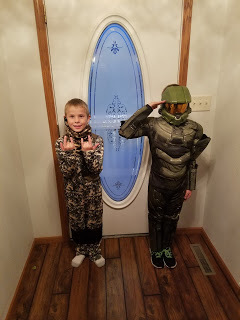 The boys in their costumes.
The boys in their costumes.
Sure, we still went trick-or-treating, and the kids (mostly) had fun (my youngest got cold and didn’t see the point in going door to door; he just wanted me to buy candy like a normal person), but I felt the void of not hanging with my sister and niece and nephew or seeing my mother-in-law.
Life is full of adjustments and changes, and I have to face them. I’m allowed to be sad and upset, but I can also look for the positive in each and every situation. Sure, it’s hard, but despite the changes and emotions that will likely come with Thanksgiving, there are also many things to be thankful for. Again, I have my immediate family to share it with. I’ll have a feast laid out on the table, and a roof over my head. I’ll get to talk to my extended family on the phone, even if I won’t be able to hug them. I have my health, and my boys have theirs too.
This year, though, I’m having a hard time mustering any excitement for Thanksgiving. This is the first time my boys and I have been so far away from our extended family, and it’s definitely settling in. While I’m excited about the four of us spending time together, I’m going to miss hanging out with everyone else. It’s going to be very different without my extended family and friends around.
I noticed at Halloween that the weight of being in Nebraska was getting heavier. Halloween is another holiday where my kids and I used to spend time with extended family. For the past several years, it has been my sister and I taking my kids and her kids trick-or-treating. We’d even make it to my mother-in-law’s neighborhood, so I got to hang out with her too. If my mom was in town, she would hand out candy at my house while the rest of us walked the streets. That didn’t happen this year, and it made me incredibly sad.
 The boys in their costumes.
The boys in their costumes.Sure, we still went trick-or-treating, and the kids (mostly) had fun (my youngest got cold and didn’t see the point in going door to door; he just wanted me to buy candy like a normal person), but I felt the void of not hanging with my sister and niece and nephew or seeing my mother-in-law.
Life is full of adjustments and changes, and I have to face them. I’m allowed to be sad and upset, but I can also look for the positive in each and every situation. Sure, it’s hard, but despite the changes and emotions that will likely come with Thanksgiving, there are also many things to be thankful for. Again, I have my immediate family to share it with. I’ll have a feast laid out on the table, and a roof over my head. I’ll get to talk to my extended family on the phone, even if I won’t be able to hug them. I have my health, and my boys have theirs too.
Published on November 19, 2017 22:00
November 12, 2017
Yet Another Giveaway!
This one is for EPIC YA/NA sci-fi and dystopian. You also have a chance to win a $50 Amazon gift card! Check it out and enter for a chance to win!
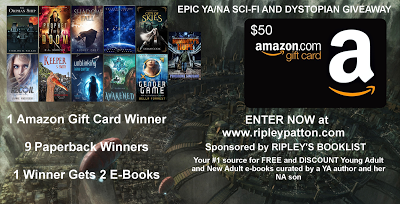
a Rafflecopter giveaway

a Rafflecopter giveaway
Published on November 12, 2017 22:00
November 7, 2017
Urban Fantasy Book Giveaway
It’s a week of giveaways!
I’ve teamed up with 26 fantastic authors to give away a huge collection of urban fantasy novels to two (2) lucky winners, PLUS a brand new eReader to the Grand Prize winner!
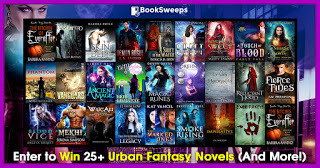
Oh, and did I mention you'll receive a collection of FREE ebooks just for entering?
You can win my novel Wucaii , plus books from authors like D.N. Erikson and Kendrai Meeks.
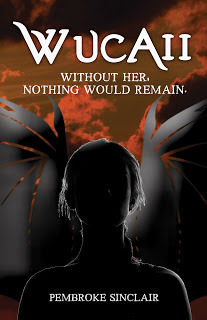
It has been 500 years since Aelana has been home, and a lot has changed in that time--including her. As a half-dragon, half-human hybrid, she has been traveling the universe destroying worlds. Both anxious and excited to return, she wonders what she will find. Her memories of home are filled with pain and loss, especially for her first and only love. She knows he won't be there, but will his memory? Will her anguish remain?
What waits for Aelana on her home world? Find out in this exciting urban fantasy novel by Pembroke Sinclair.
Enter the giveaway by clicking here.
Good luck!
I’ve teamed up with 26 fantastic authors to give away a huge collection of urban fantasy novels to two (2) lucky winners, PLUS a brand new eReader to the Grand Prize winner!

Oh, and did I mention you'll receive a collection of FREE ebooks just for entering?
You can win my novel Wucaii , plus books from authors like D.N. Erikson and Kendrai Meeks.

It has been 500 years since Aelana has been home, and a lot has changed in that time--including her. As a half-dragon, half-human hybrid, she has been traveling the universe destroying worlds. Both anxious and excited to return, she wonders what she will find. Her memories of home are filled with pain and loss, especially for her first and only love. She knows he won't be there, but will his memory? Will her anguish remain?
What waits for Aelana on her home world? Find out in this exciting urban fantasy novel by Pembroke Sinclair.
Enter the giveaway by clicking here.
Good luck!
Published on November 07, 2017 22:00
November 5, 2017
YABC Around the World Book Giveaway
I am participating in the YABooksCentral.com Around the World in 30 Days giveaway!

There are 45 authors participating from all over the world, from Indonesia to South Africa, Guatemala, the US, UK, Europe, and Australia! It’s an amazing collection of books. Join in on the fun!
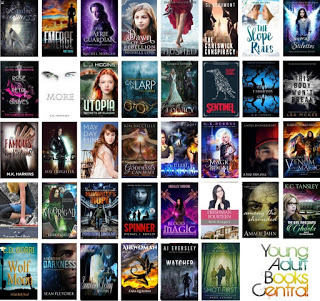
For a chance to win, you can enter here .
The book I have entered into the giveaway is Humanity’s Hope. I’m super excited to be part of such an amazing group of authors. I hope you’ll join in on the fun and discover YA authors from around the world!
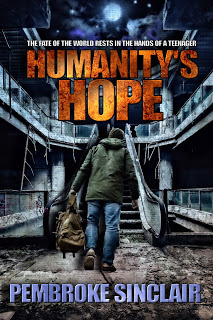
What happens when humanity's hope rests on the shoulder of a teenager?
Caleb didn’t come out of the zombie uprising unscathed. He’s been scarred—both mentally and physically. The rest of humanity is trying to rebuild, to make the world normal again. Caleb is trying to return to a normal life also, but after all he’s seen, after the loss of his family and friends, the transition is difficult. The darkness that led him down a path of self-doubt and self-harm has never left his mind.
Things only become worse when he discovers he’s immune to whatever makes a zombie a zombie. Fighting zombies was predictable. He knew what to expect. Fighting humans is volatile. They are malicious and treacherous. They won’t stop to get what they want, and Caleb has to figure out exactly what that is.
This book can also be found at Amazon.
The giveaway lasts the entire month of November, but don’t delay. Again, if you want to enter for a chance to win, you can find the link here .

There are 45 authors participating from all over the world, from Indonesia to South Africa, Guatemala, the US, UK, Europe, and Australia! It’s an amazing collection of books. Join in on the fun!

For a chance to win, you can enter here .
The book I have entered into the giveaway is Humanity’s Hope. I’m super excited to be part of such an amazing group of authors. I hope you’ll join in on the fun and discover YA authors from around the world!

What happens when humanity's hope rests on the shoulder of a teenager?
Caleb didn’t come out of the zombie uprising unscathed. He’s been scarred—both mentally and physically. The rest of humanity is trying to rebuild, to make the world normal again. Caleb is trying to return to a normal life also, but after all he’s seen, after the loss of his family and friends, the transition is difficult. The darkness that led him down a path of self-doubt and self-harm has never left his mind.
Things only become worse when he discovers he’s immune to whatever makes a zombie a zombie. Fighting zombies was predictable. He knew what to expect. Fighting humans is volatile. They are malicious and treacherous. They won’t stop to get what they want, and Caleb has to figure out exactly what that is.
This book can also be found at Amazon.
The giveaway lasts the entire month of November, but don’t delay. Again, if you want to enter for a chance to win, you can find the link here .
Published on November 05, 2017 22:00



